-
Archives
- November 2017
- November 2016
- October 2016
- April 2016
- March 2016
- November 2015
- February 2015
- July 2014
- June 2014
- October 2013
- January 2013
- October 2012
- July 2012
- April 2012
- March 2012
- February 2012
- January 2012
- December 2011
- November 2011
- October 2011
- September 2011
- August 2011
- July 2011
- March 2011
- February 2011
- January 2011
- November 2010
- September 2010
- April 2010
- March 2010
- February 2010
- March 2009
- February 2009
- March 2008
- February 2008
- November 2006
- August 2006
- March 2006
- August 2005
- July 2005
-
Meta
Monthly Archives: November 2015
Al-Said, not Al-Saud 3
It Went Plunk
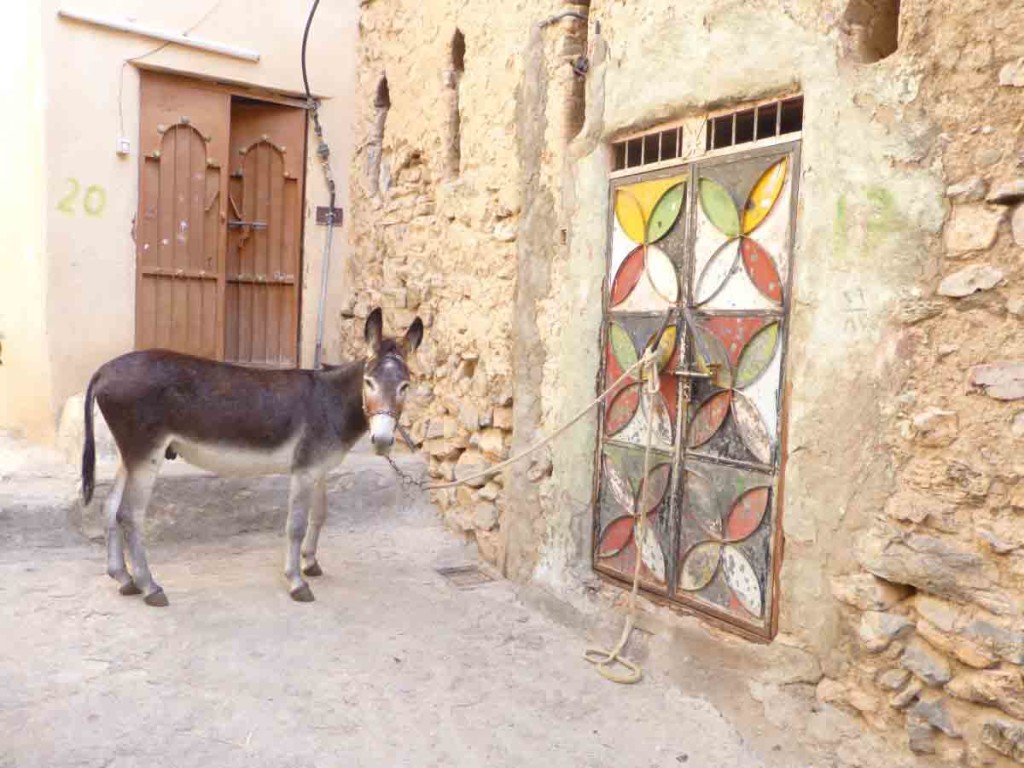
Picture me traveling through another dimension, a dimension not only of sight and sound….. I’ve left Misfat Al Abriyyin…..I’ve entered the Twilight Zone…. Otherwise known last Thursday in Muscat as the Royal Opera House. Visualize an imposing modernesque Arab hall flanked by stately palm trees, gold light from crystal chandeliers beckoning us across a broad esplanade.
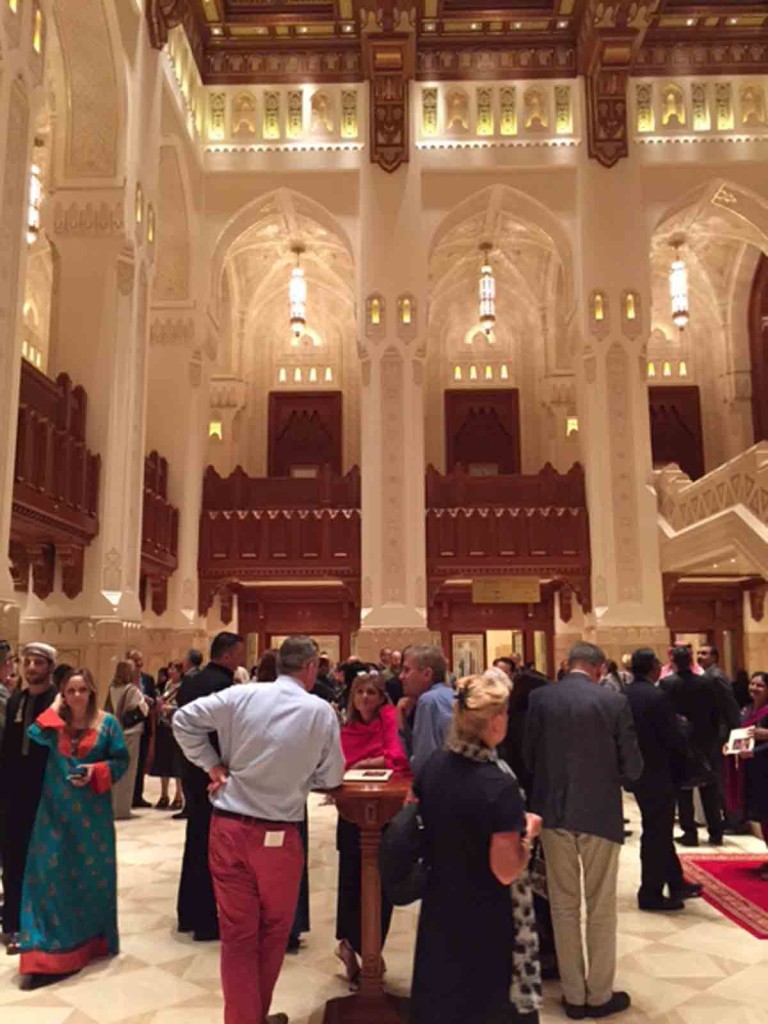
As we enter through lofty Arab-style arches I walk carefully across the over-polished marble floor, mindful not to slip and embarrass myself with a shrieking “whoops” and splat. Blonde marble pillars soar 3 stories through the atrium. One second Bernard is at my side, the next second he’s gone. Having arrived in jeans at a hall where formal attire is decreed, he’s been politely but firmly escorted to a dressing area where he’s kitted out in a white dishdasha and a beige turban embroidered with scarlet foll-de-roll.
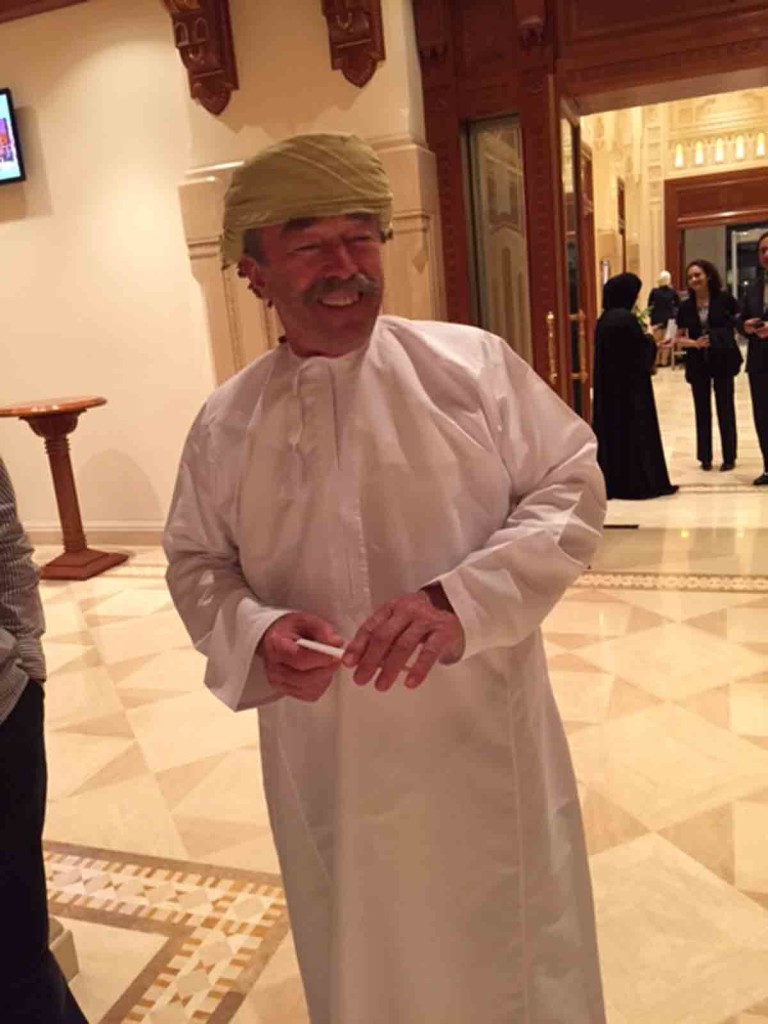
At 7pm sharp the red velvet curtain rises on a full production of E. Kalman’s The Csardas Princess, performed by the entire cast of principals, choir, ballet AND orchestra of… wait for it…. wait for it! …. the Budapest Operetta And Musical Theatre. This is not some lesser roadie production. Everyone from Budapest has come along, including stage hands to put up the massive set, as well as lighting crew, hair dressers and costume department for those turn-of-the-century gowns and wigs.
You have to understand that here in Muscat, the primary form of entertainment is to drive one’s Ferrari round and round a one-lane street loop of no more than a tenth of mile, revving the engine. If it’s National Day, as it was Nov. 18, you’d add honking, and waving a white, red and green Omani flag. (Now that you know the flag colors you will understand why the highway decorations stretching for many tens of mile, are not for Christmas.) When you’re tired of squealing your tires for 10 feet, you’d indulge in the one other form of fun in Muscat: taking the entire family for spa day, Moms and little daughters to one side for mani-pedi’s, fathers with little sons down the hall for full body massages.
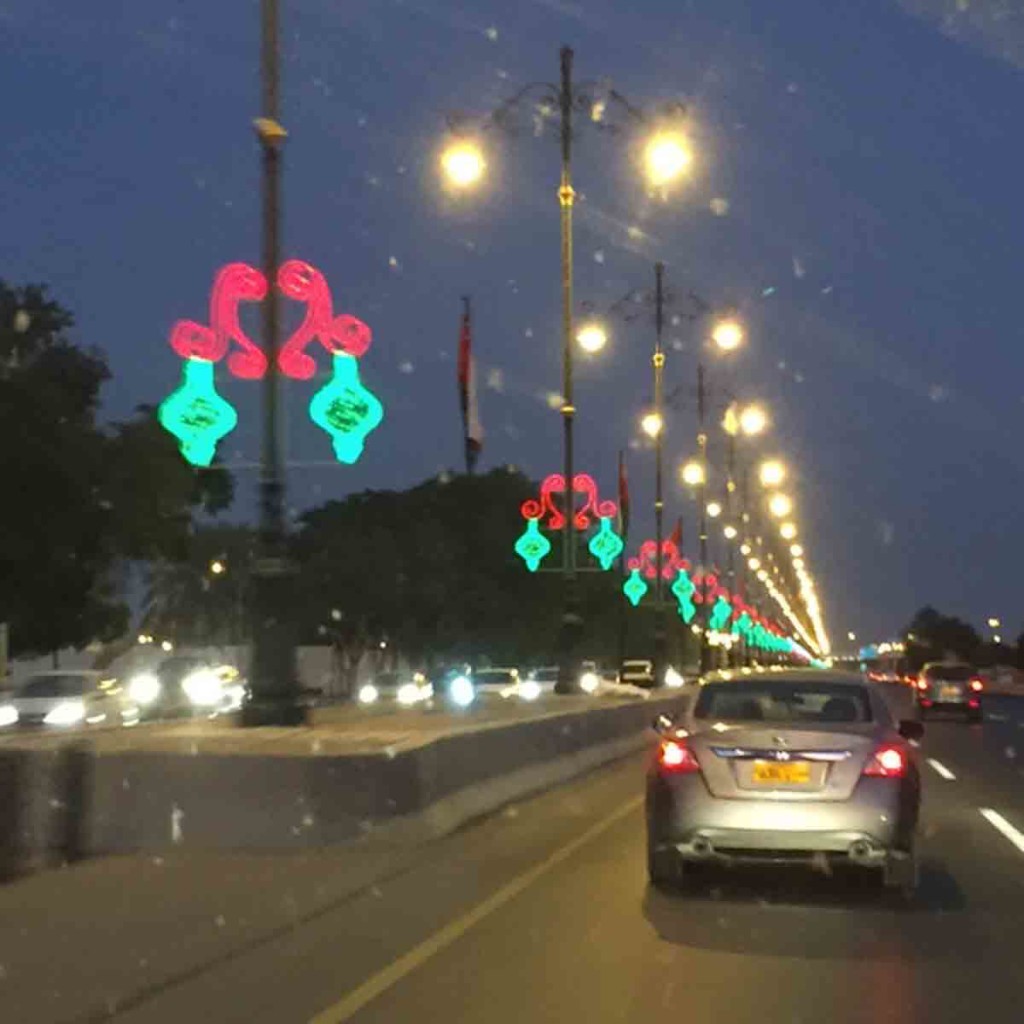
Back to A Night at the Opera: There they were, a group of classically trained lyric divas imported –perhaps on the Sultan’s 747?– to perform this bit Hungarian froth for one night only in the plush red and gold interior of an opera salle which, apart from the Arab-style curlicues gracing the loge boxes, looked suspiciously like a mini Metropolitan Opera. That, and the seat-back libretto translations available in both Arabic and English, were the main signs that I wasn’t in Kansas anymore (to mix movie line metaphors). On stage, Hungarian arias soared and feet in red boots stamped a Csardas rhythm. Since a Csardas ia an old Hungarian tavern dance the audience thought nothing of clapping along during the operetta’s wilder moments. I joined in, happily freed from my Western straitjack of serious attention to classical music. Bernard tapped his fingers and shot me a smile-frown for my appropriate inappropriate behavior.
And now, briefly, to that mysterious room in the wadi village of Sayq, where you last saw me.
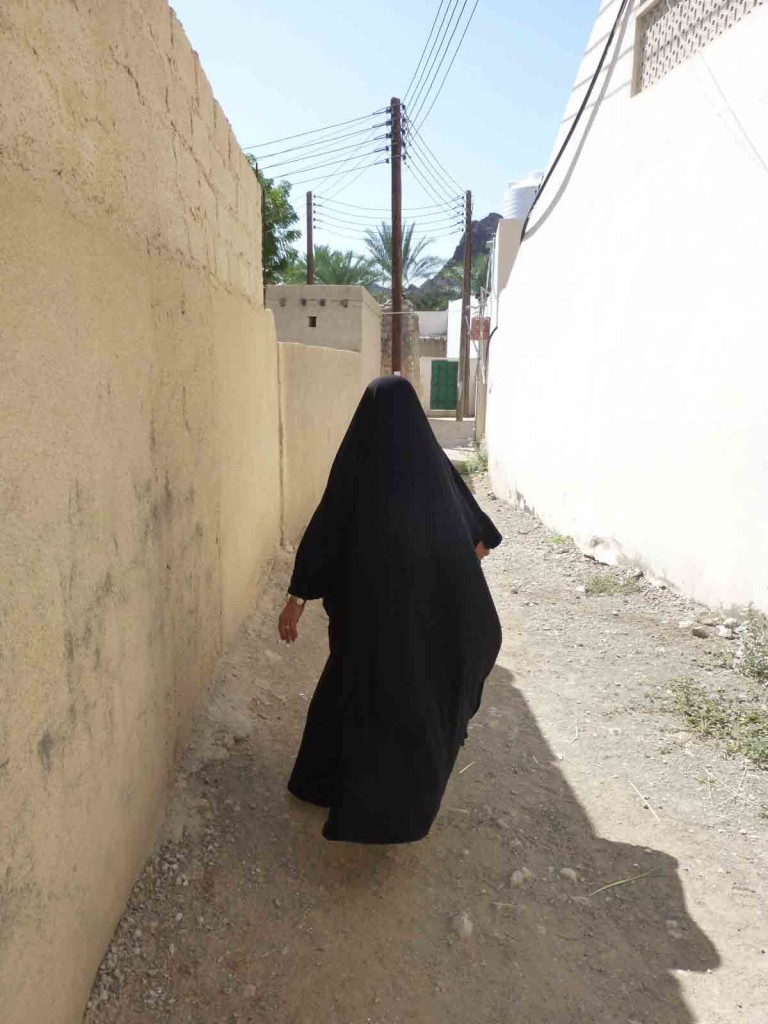
It turns out the lavish buffet of Omani sweets and fruits were on offer all day, every day, for 30 days, in observance of the birth of a baby in the family. The Omani way is for people to come by, greet the new baby, and bring food. During that period the household room otherwise reserved for men is opened to everyone. Then, in a fit of massive cleaning, everything’s washed and the sexes go back to their former separateness. We arrived on Day 17, thus were welcomed to sit and indulge. Kids ran in and out.
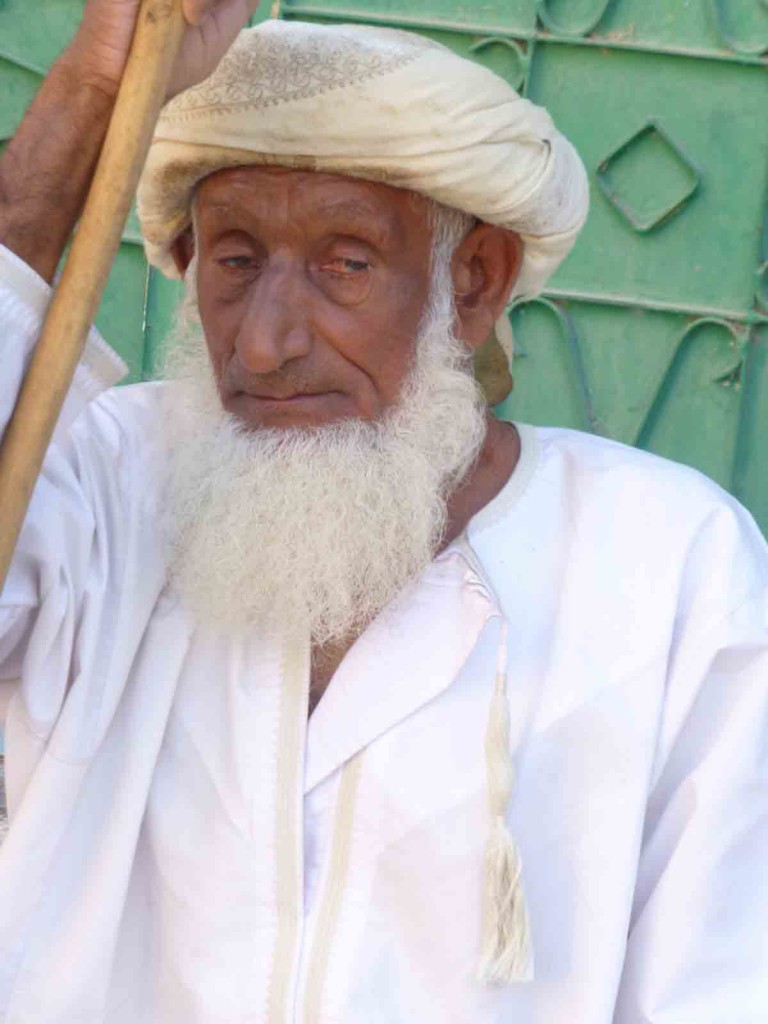
The family patriarch– a slight serious man with trim white beard– glides in looking, if this is possible, both happy and mildly unsure whether to approve. He nods, wishes us peace, then adjourns to the nearby minaret to call the faithful to noon prayer.
Our visit began with the traditional offer of kahwa, Omani coffee laced with cardamom, which you sip while eating a date as a sweetener. From there we were urged to help ourselves from dishes of dense Omani treats. As these were all homemade they were tooth-achingly sweet and utterly delicious. My favorite was the Halwa, thick and sticky as old molasses, chunked with sesame seeds and almond slivers, the dense paste itself spiced with saffron, cardamom and nutmeg, scented with rose water and sweetened (traditionally) with date syrup. There also was a sweet that looked like peanut butter, but tasted like solidified dulce de leche. And one that looked like thick, smooth porridge, but tasted like sweetened tapioca, which it probably was.
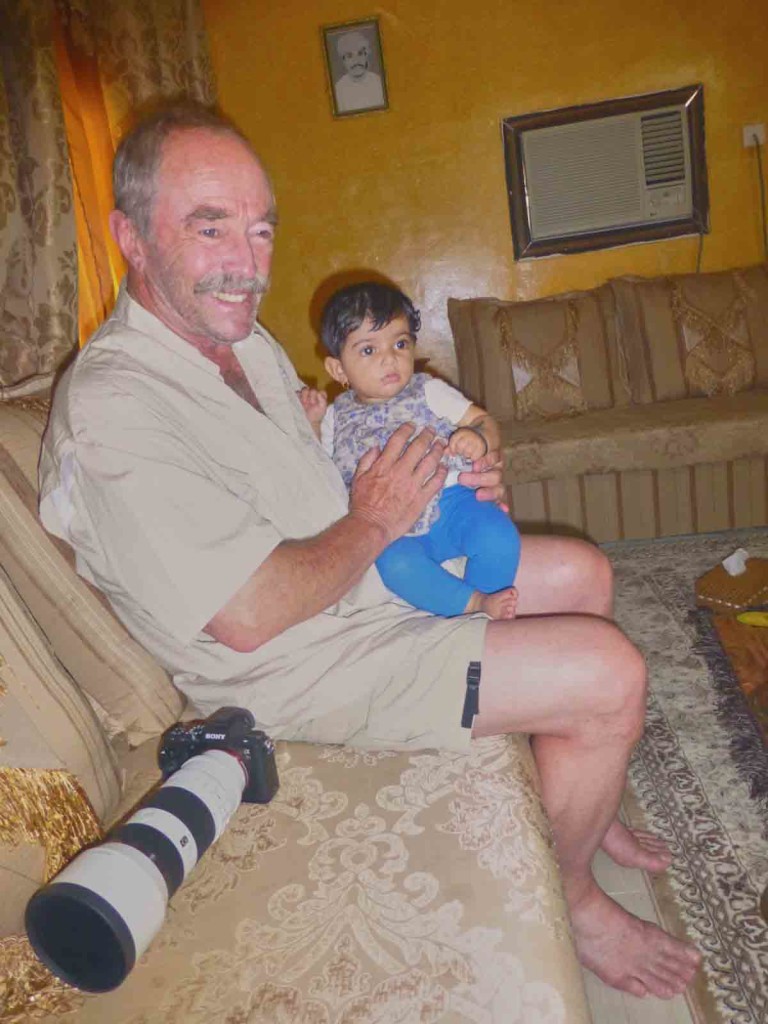
I, naturally, indulged as only an adventurous food lover would. Bernard kept nodding his head that he’d join me on the floor, but given that he can’t sit cross-legged comfortably, I knew that wasn’t likely to happen. More important, as soon as he’d perched himself on the wall bench, he was plied with infants, so could not, in all politeness, move.
Here’s an interesting tidbit: Of Oman’s estimated 4 million population, over 40% are foreign workers, mainly from India and Bangladesh. All but one of the coffee shops where we stopped for a fresh juice or snack during our drive each day, were run by Indians and served only Indian foods.
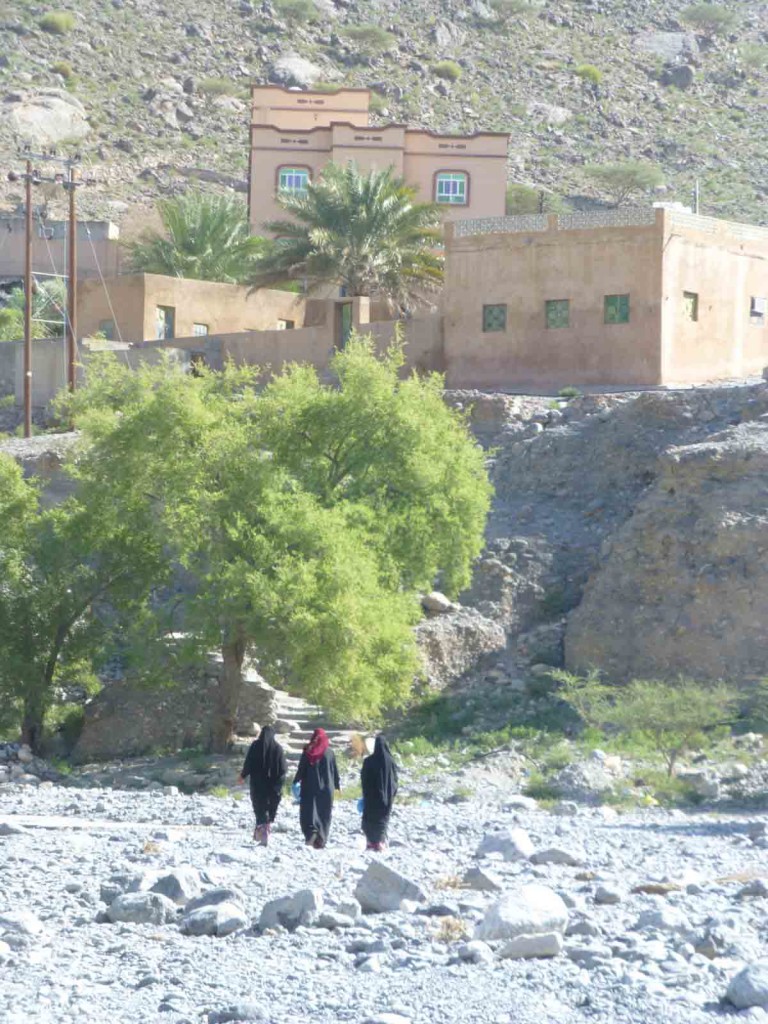
Here’s another bit: In this country where wadis are the only viable place from which to craft a village life, isolation is a product of geography, not choice. Thus it’s entirely common to marry a close family member.
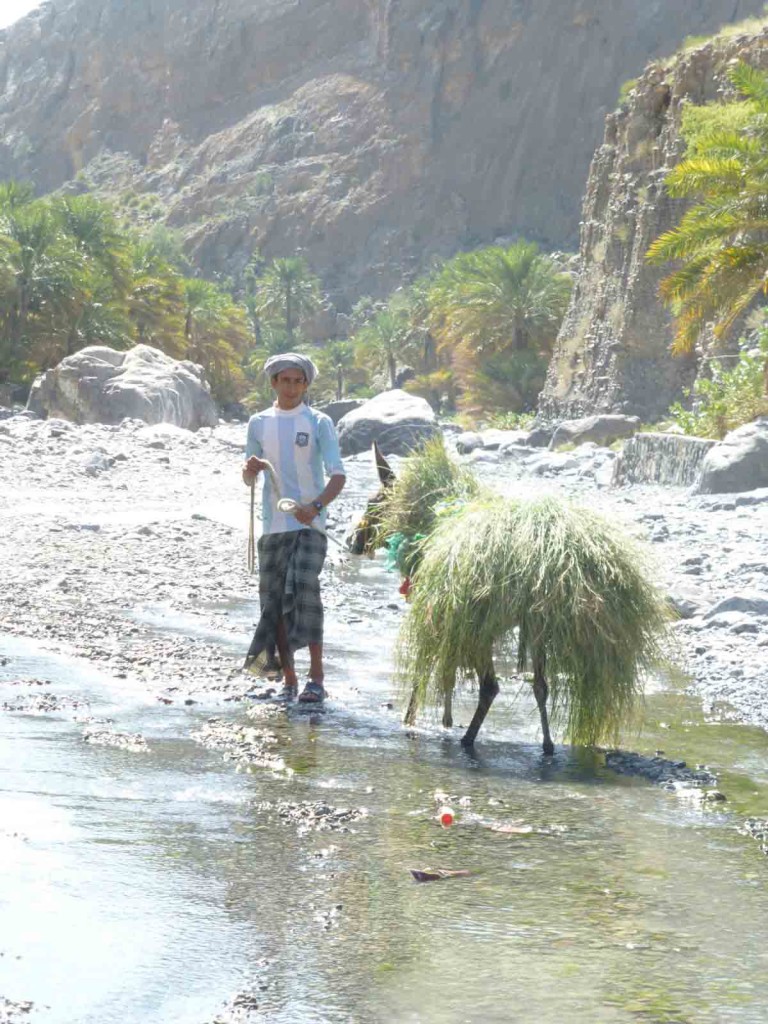
Nora, the lovely young woman I spent an hour talking to in Sayq village– in between nibbles of boiled sweets–, kept referring to her mother-in-law as Auntie. I thought it was a friendly mis-translation.
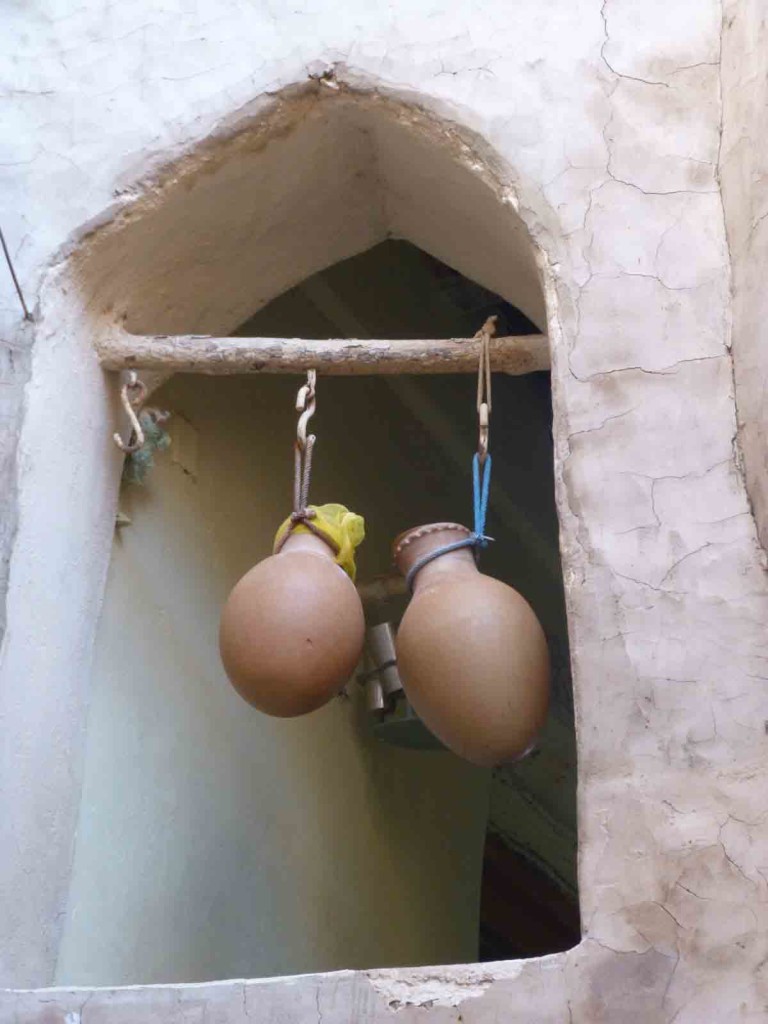
“But she’s your mother-in-law, yes?
Yes.
So how can she be your Aunt, too?
She’s married to my father’s brother.”
And you’re married to her son?
Yes.
So she’s your Aunt AND your mother-in-law
Yes.
And you did this of your own choice? No one told you you had to marry each other?
No. We chose each other. And we’ve known each other since we were small.”
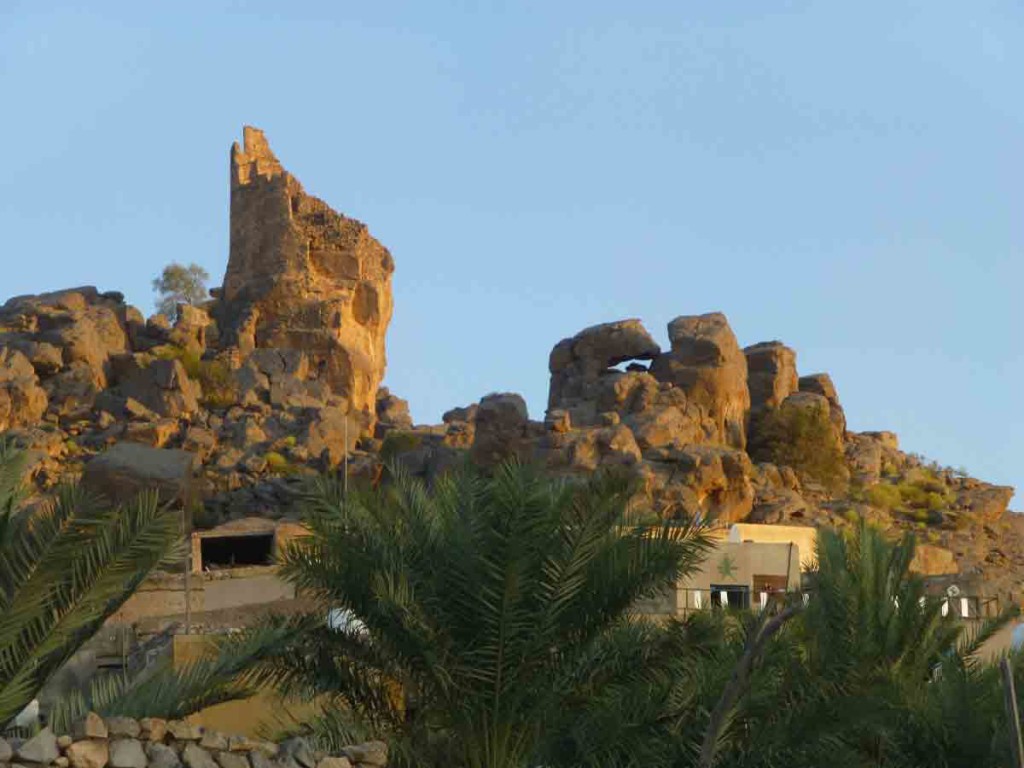
Assured that I had it all straight, I took another spoonful of halwa, to keep my mouth occupied while I pondered the obvious. However, based on the stupendous cuteness of her 10-month-old daughter, who quietly amused herself with Bernard’s mustache while sitting on his lap for an hour, there was no problem with that marriage!
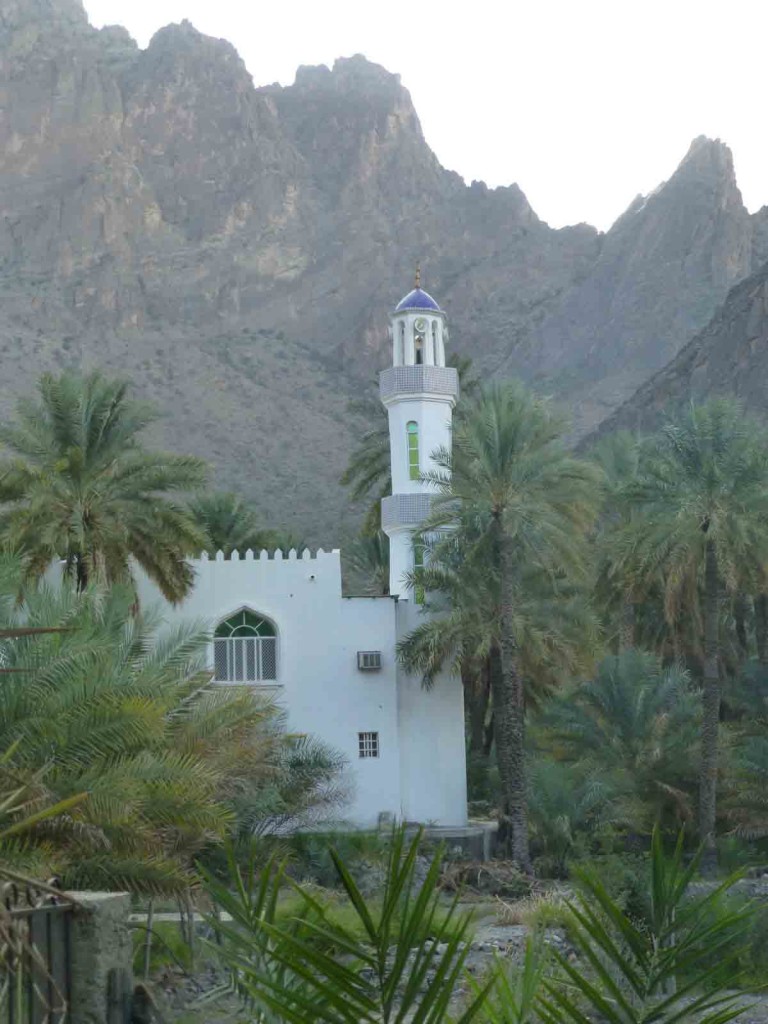
There have been other twilight zone moments….
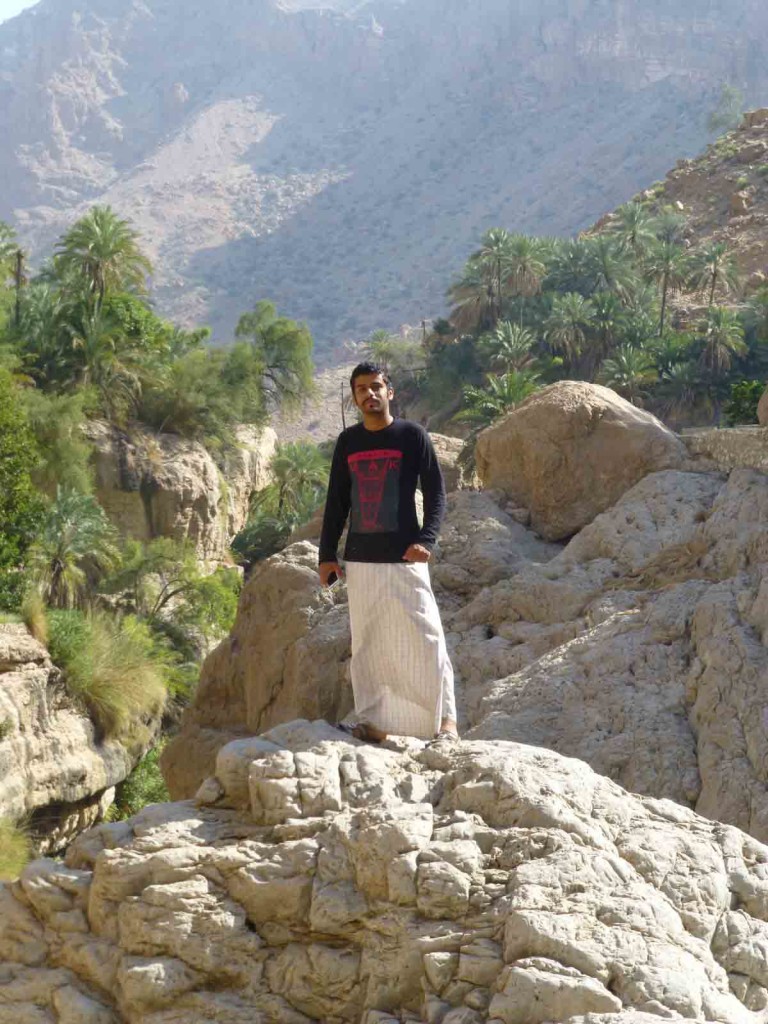
Yusef, in the village of Mibam above Wadi Tiwi, appeared from an apricot colored house next to a spreading plane tree. I was alone, waiting for Bernard to back the car around into the shade. As if materializing from thin air, Yusef was beside me, with softly curling hair and a ready smile, offering to show us through the village palm groves, along burbling falaj, down to a pool where we could swim.
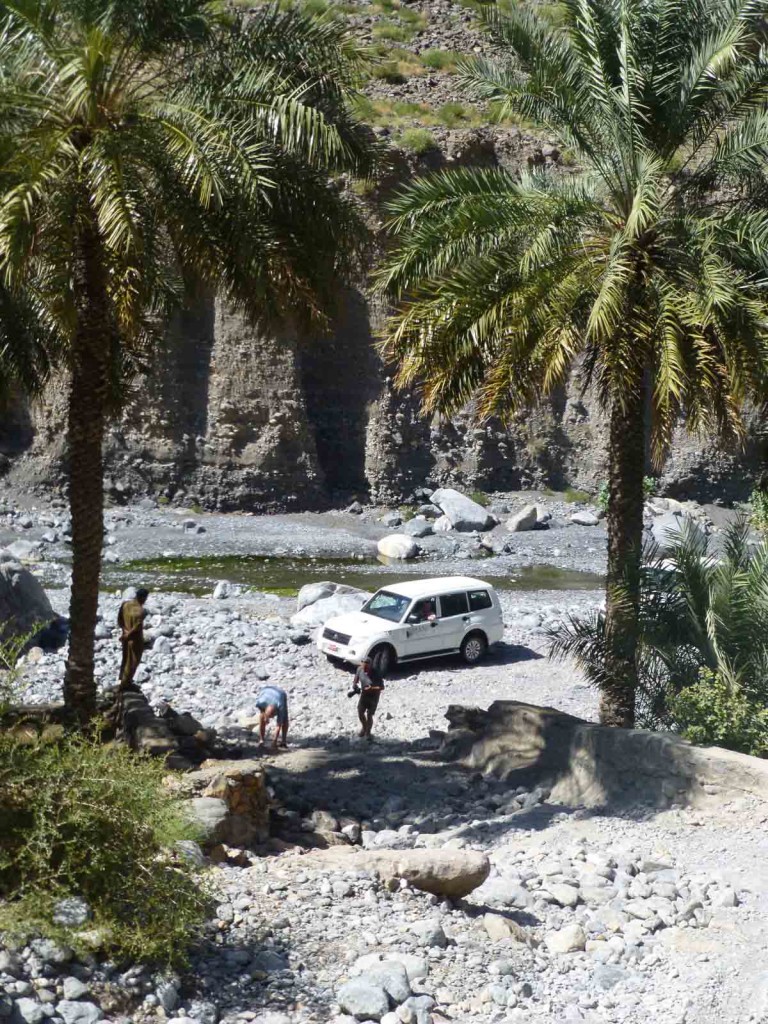
A couple days later we drove into the desert, our destination a tree 50km into the Wahiba Sands. When you’re miles from nowhere in the middle of a sandy expanse, a tree is an uncommonly friendly sight. We had just set our camp chairs underneath, sitting with arms and legs splayed to enable the soupçon of breeze to cool us, happy in the quiet emptiness of the desert. Then Rashid appeared, ripping down the tall flank of a dune in his 1/4-ton Toyota pickup, pulling a red-sand U-ie and spewing me with pink-orange dust as he screeched to a halt. Or would have screeched had he been on pavement.
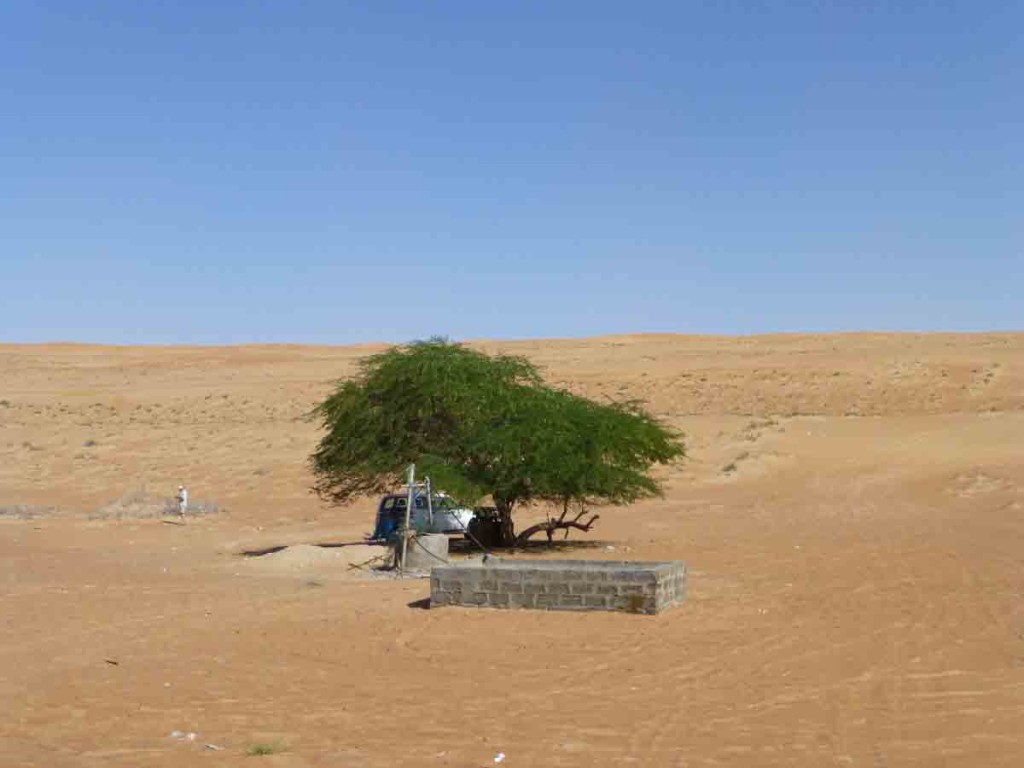
“Getting water for my camels,” he signed, gesturing further that he had four baby ones just a dune or two away. Rashid was a man on a mission. He grabbed a fat black hose, jammed it into the 300-gallon tank in his pickup bed, marched over to the Honda generator that served the pump which pulled water out of the oasis well, and while the water level in the tank slowly rose, made further friendly gestures about eating.
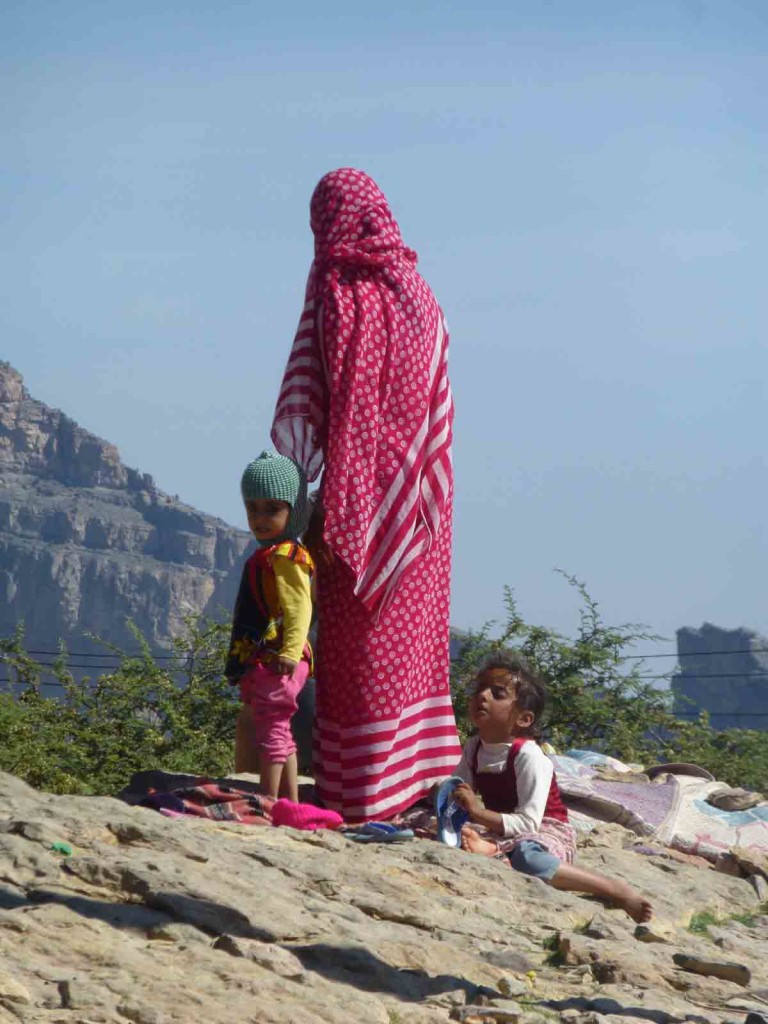
Omani being friendly and hospitable, and this being more his oasis than ours, I offered him dates and Britannia digestive biscuits. Good start. He took several of each and nodded happily. I then thought to offer him a slice of German fruitcake from a package I’d found at a town shop. This’ll make us fast friends,” I thought, already dreaming of visiting his camel babies. Rashid looked at the stock tank, which was nigh full, stuffed stuffed the whole fruitcake in his dishdasha and drove off.
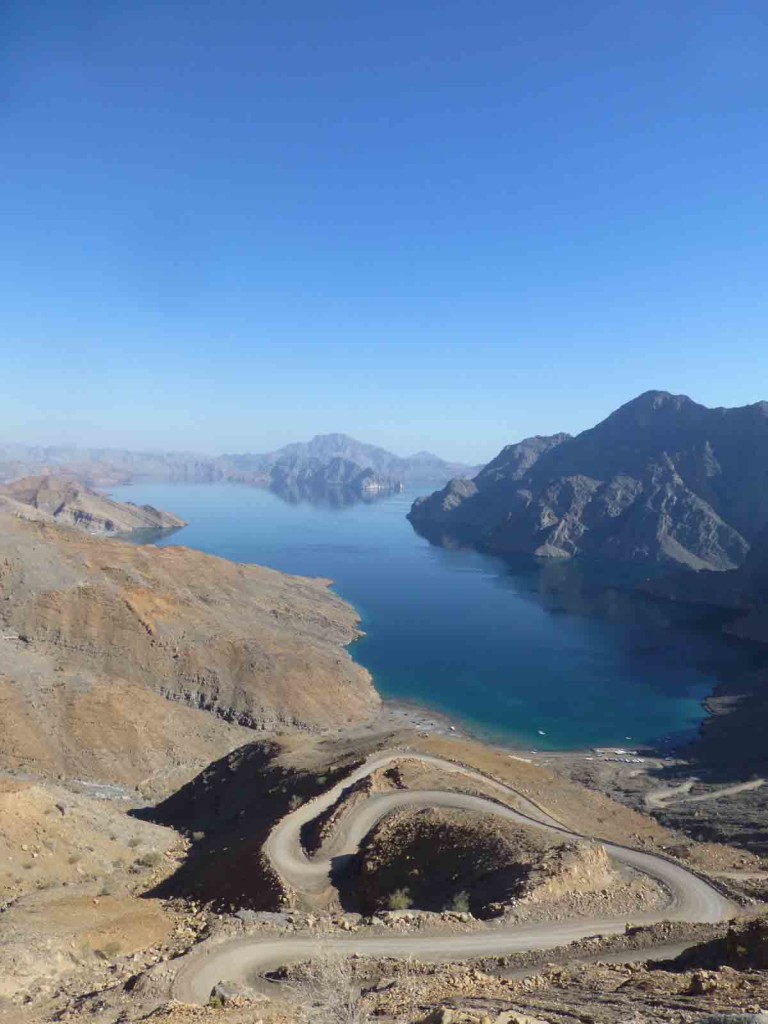
I’ve walked a few beaches of sand and ocean-smoothed pebbles, my head down, oblivious to everything but my search. Once again I’m 5 years old, searching for shells. This time I found a few purple, speckled cowries, a scallop shell, some frosted green sea glass.
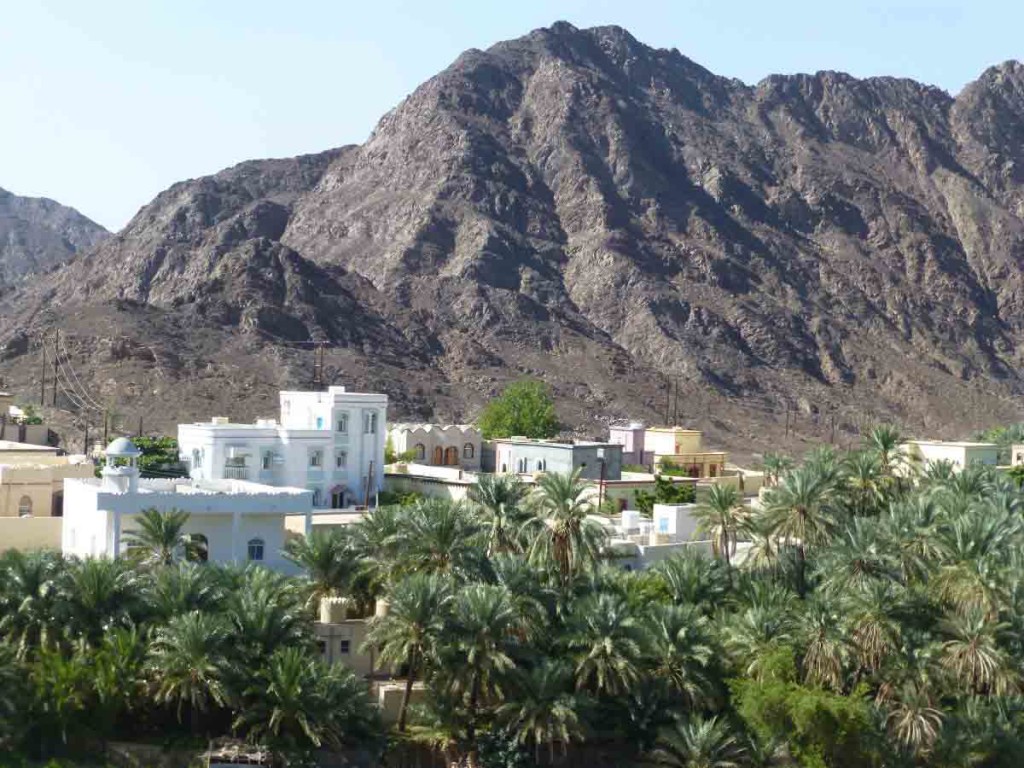
I’ve camped one last time in a stony wadi, sitting on Persian carpets watching thunderclouds pile up like cushions after a casbah pillow fight. It’s when camping in this alcohol-intolerant country that the true nature of our group emerges. That night we wobbled to our tents hoping we’d not be washed into oblivion by a flash flood rampaging out of the slot canyon behind us.
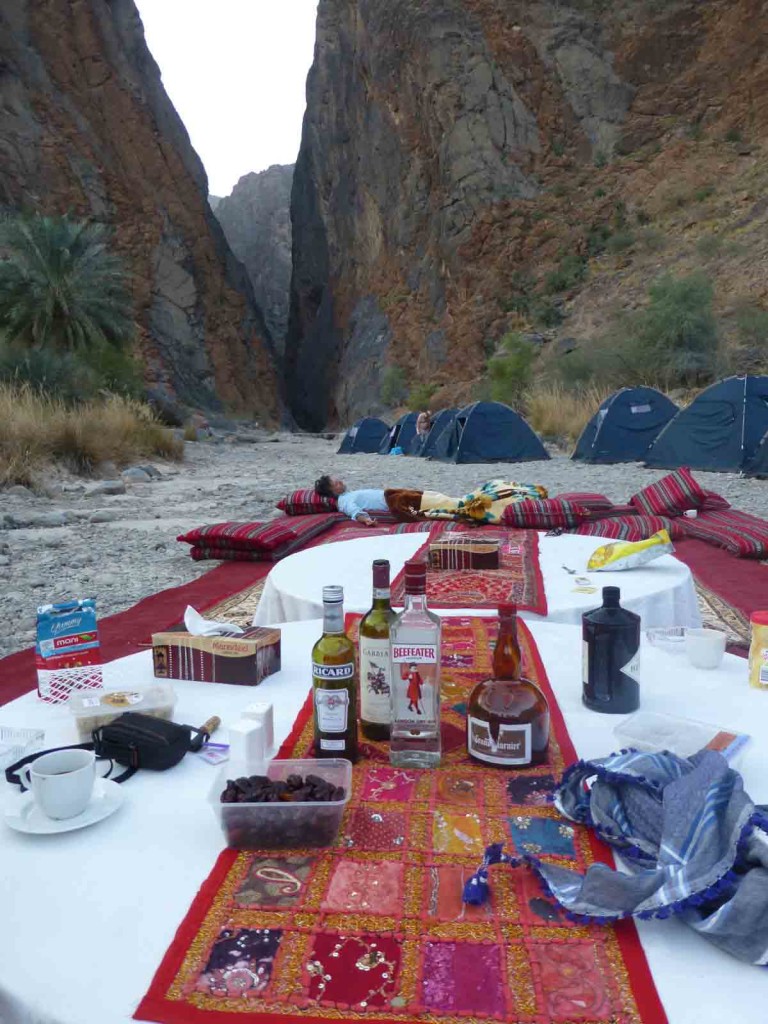
I’ve floated on a sleepy dhow in the Musandam fjords, watching a waxing crescent moon rise over cinnamon hills.
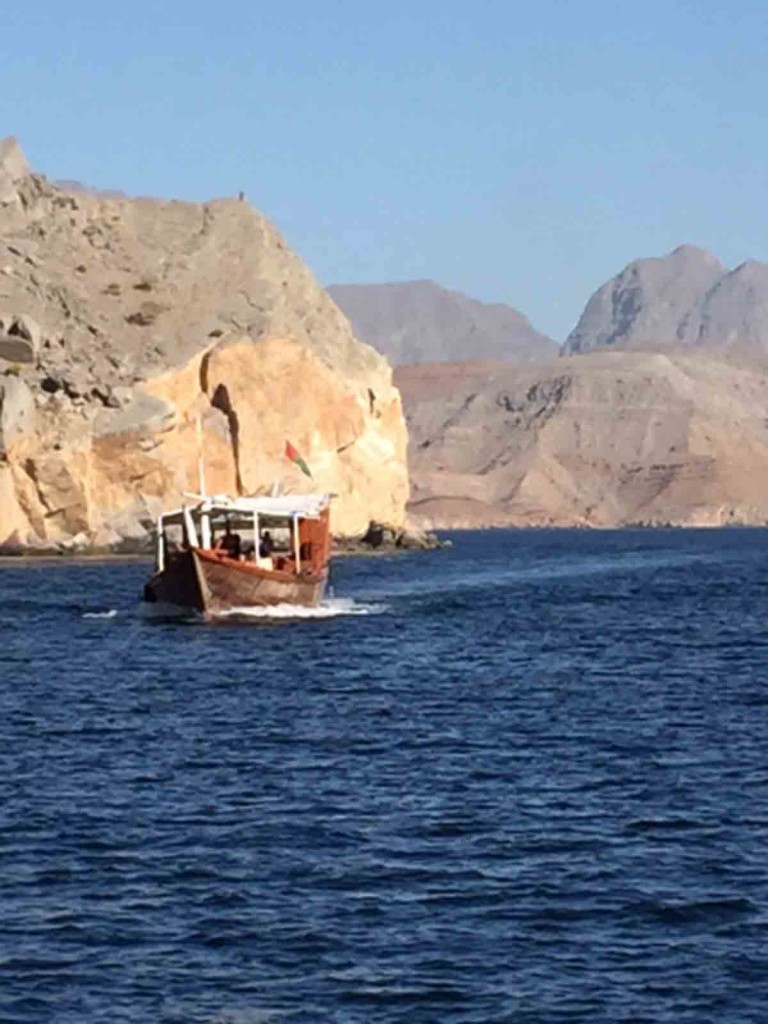
And then, my camera fell into the sea. Really.
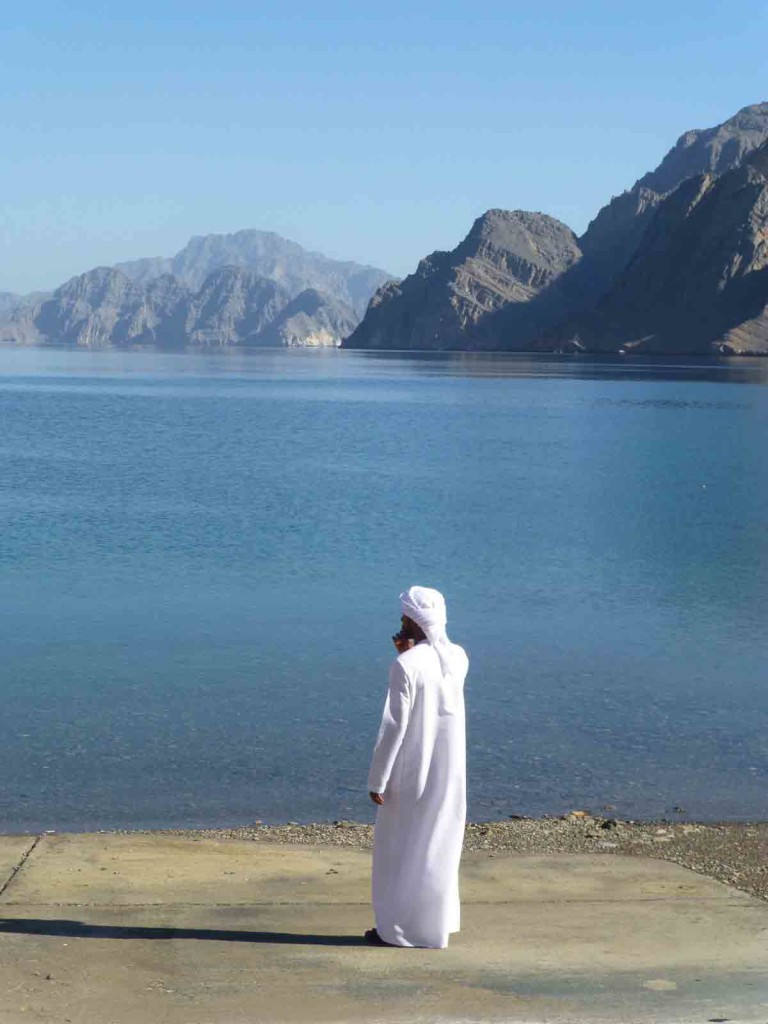
So that’s some of Oman for you. We have a pressing engagement tonight: One week post-opera and we’ll be perched (like Lily Tomlin’s Edith Ann in that oversized rocking chair) in the Gold Class VIP section of the local cinema. The normal theatre row holds 20 seats, but the VIP row holds only six sofa-sized seats. On screen: Spectre!! Here’s how you say James Bond in Omani: James Bond.
And that’s the truth……
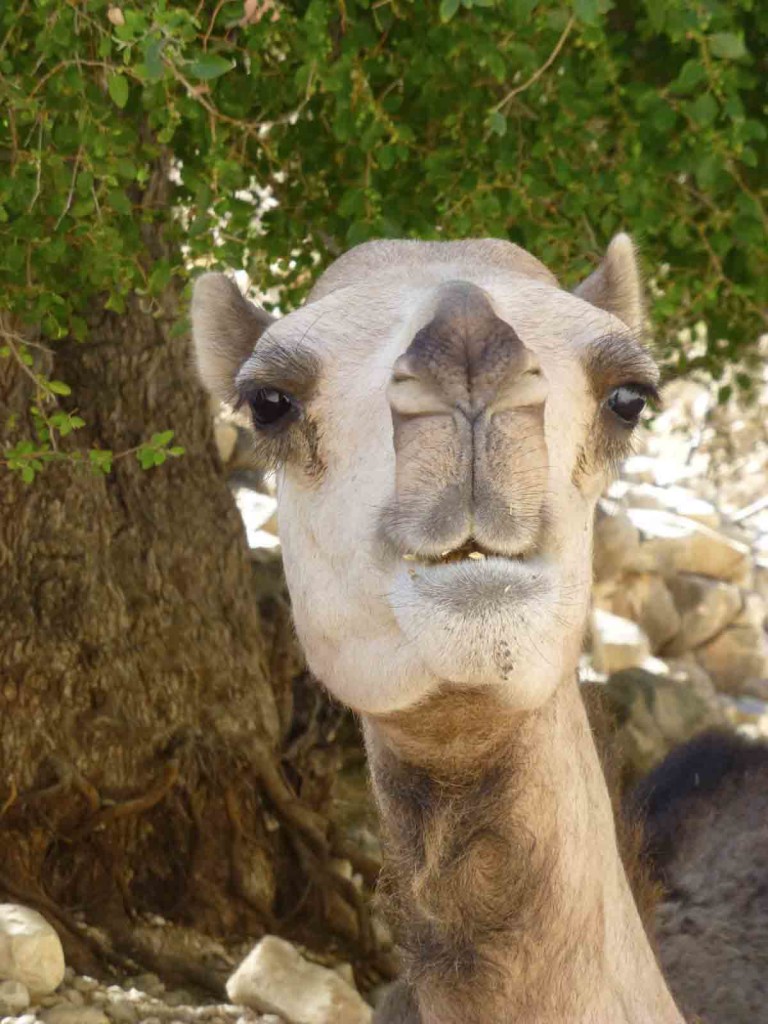
Posted in Dispatches, Oman
Leave a comment
Al-Said, not Al-Saud 2
We’re On the Road
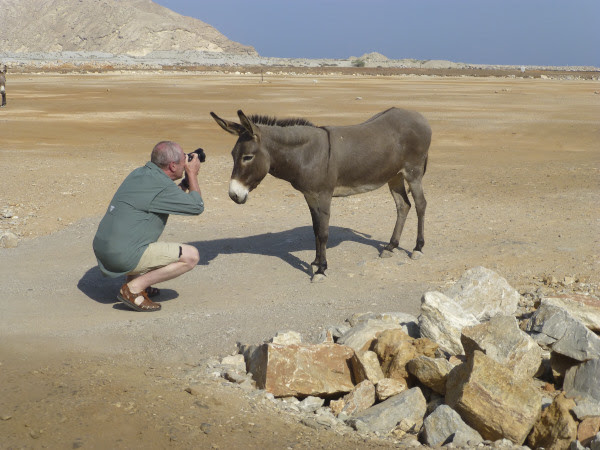
Mid-morning, a couple hundred kilometers south of Muscat. We drive through Wadi Arbiyyin, past sleepy farming hamlets shaded by dense groves of date palms and banana trees. The groves are arcs of feathery green through which wind falaj (canals) carrying cool blue water from the shallow river paralleling our track. When we stop the car, a soft duvet of silence enfolds us. No engines, no airplanes overhead, a perfect stillness through which I hear the crunch of wadi grass tugged by a black donkey, a cough from behind a thick slab wall, the dull thwock of someone chopping, the slap of wet clothing about to be hung to dry.
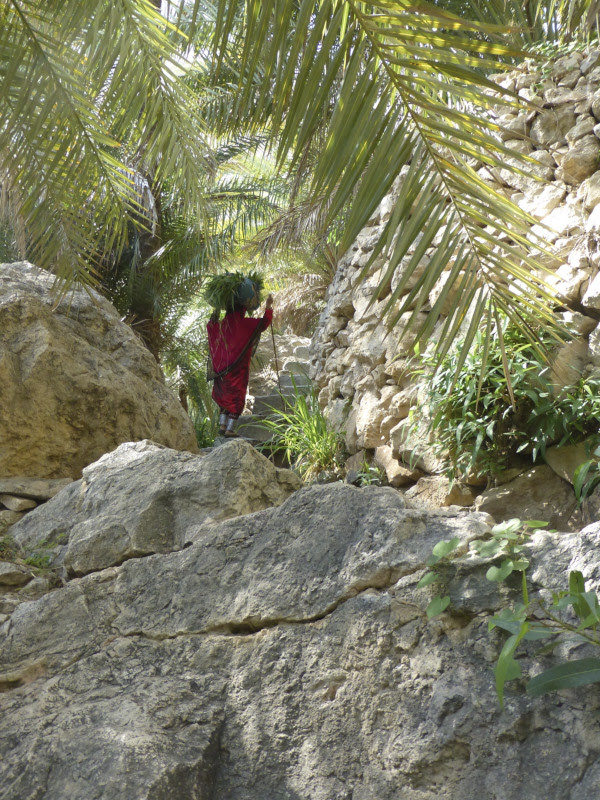
The only visible activity in Wadi Arbiyyin mid-morning are the many-colored long-haired goats, coats carefully combed and trimmed, out to scavenge the best thorn from a low acacia.
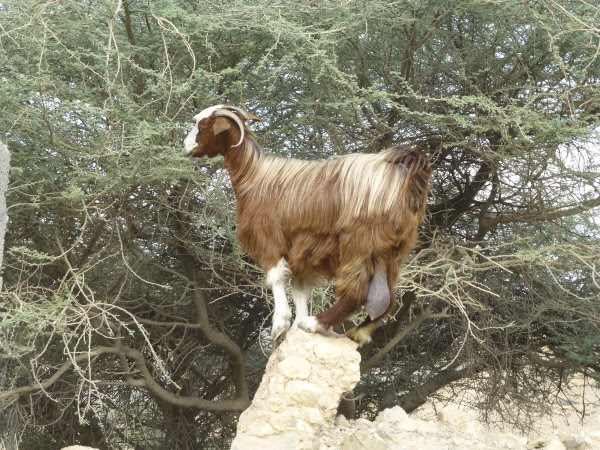
The sun is hot, perhaps 80 degrees, but the shade is divine. The sum of the two gives you a glimpse into this country of yin and yang: opulent new homes fronting ancient village simplicity, desert dunes of the finest red sand below tumultuous mountains of brown stone, baking dry wadis (watercourses) of silvery boulders holding limpid hidden pools of crystal green cool water in their lap.
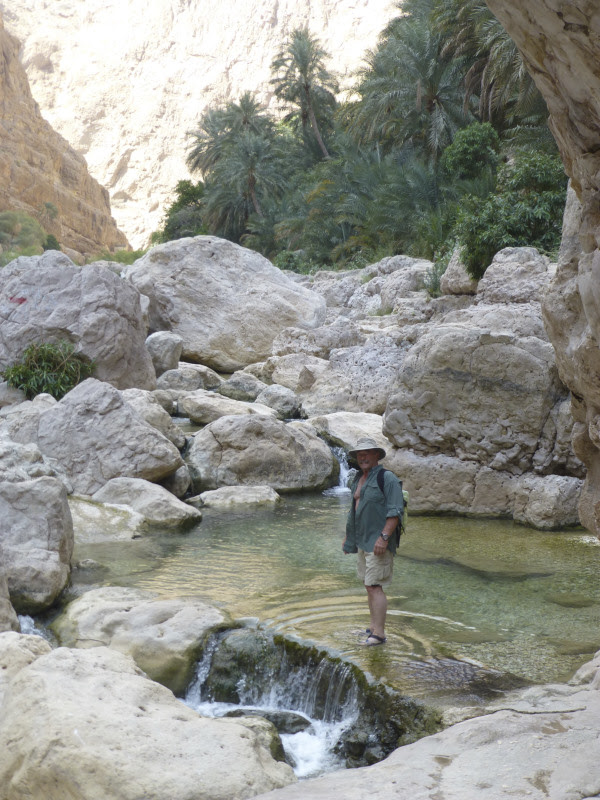
The road winds to the top of the ragged wadi cliffs, depositing us on a frenetically rocky low plateau speckled with ivory, beige and salmon-color boulders. “There, no not there, over there,” Bernard points out a line of grey-black rocks. Our dirt track brings us nearer. As we approach, pale dust pluming behind us, we see that the blackness now swaths the plateau like Dracula’s cape over a fresh victim. “Must be lava,” Bernard says, oblivious to the fact there are no volcanoes around. And now that we live in Bend, we do know volcanoes. I don’t hesitate to point out the lack of a lava source to Bernard, but after a few minutes I have to agree with him. It does look like lava. Continuing on, the roadway carves through a hump of earth resembling a slice of fruitcake (I do love fruitcake), with soft red earth instead of whisky-soaked cake and assorted cobbles instead of citron peel and candied cherries. “This looks like ground that used to be underwater,” I say, oblivious to the fact that we’re on a plateau and there’s no sign of a watercourse of any kind.
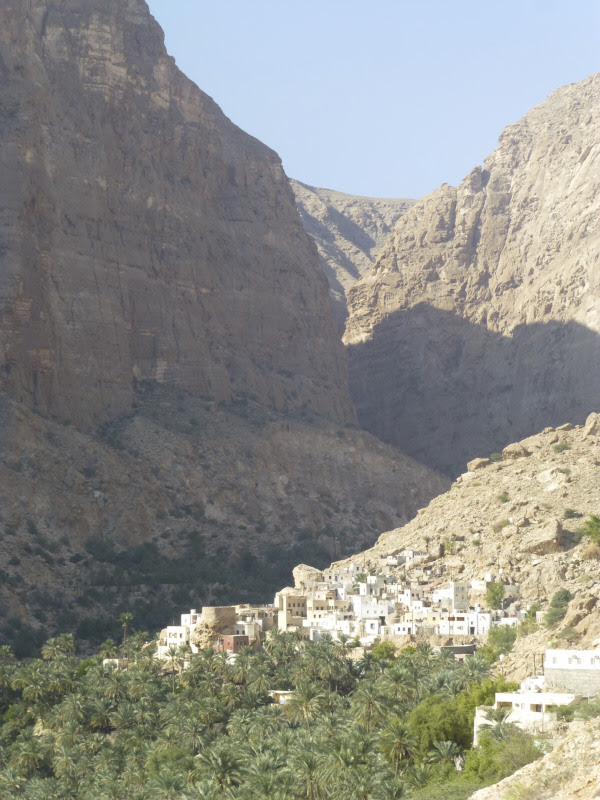
Stumped by our ignorance, neither of us hazarded a word on the subject till the next day, when we happened upon two German geologists at the bottom of the Bimah Sinkhole, proof that in travel, serendipity is everything. Really, I should say they were at the surface of the water at the bottom of the Bimah Sinkhole, because they were very much alive and doing measurements to glean obscure facts about sinkholes. Instead of swimming — and I must say the green-blue pool of fresh+salt water was tremendously inviting–, we questioned them about the incomprehensible landscape we’re seeing.
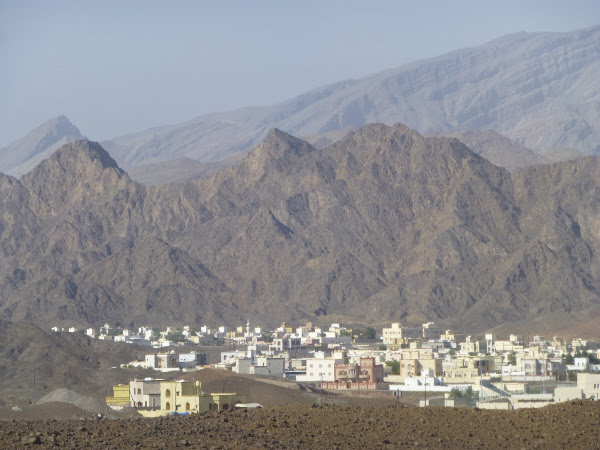
Allow me to distill half an hour of education into one simple sentence: All of Oman used to be under the sea. The immense cliffs that look like melted wax, that black mantle over orange rocks, the convoluted fins of brown, then grey, then rust, all are features created by forces under the sea.
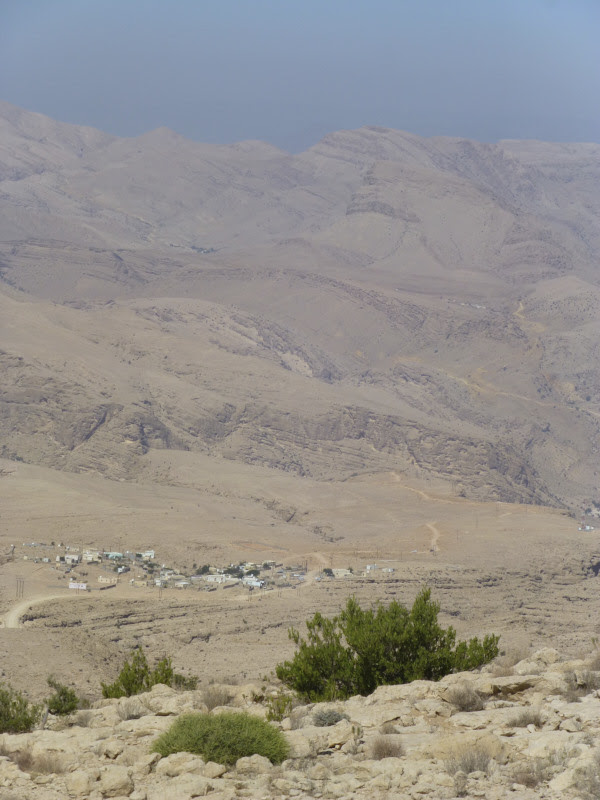
I’ve seen lots of landscapes in our travels, but never have I seen one shaped so purely by existing submerged for eons. None of the shapes that come from erosion, such as in our glorious national parks in Utah, or the sharp mountains created by tectonic uplifts, like the Himalayas, exist here. It’s another world, and not only in terms of what’s around us.
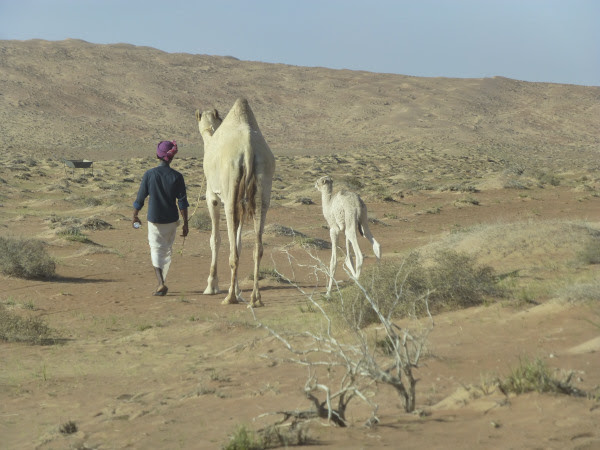
Everything that I thought I knew from elsewhere has a particular Omani spin to ti. I’ve sipped tiny china cups of scalding coffee spiced with cardamom, savored small, soft brown dates of dreamy sweetness, torn a mouthful of hot flatbread rolled around freshly scrambled eggs speckled with hot sauce.
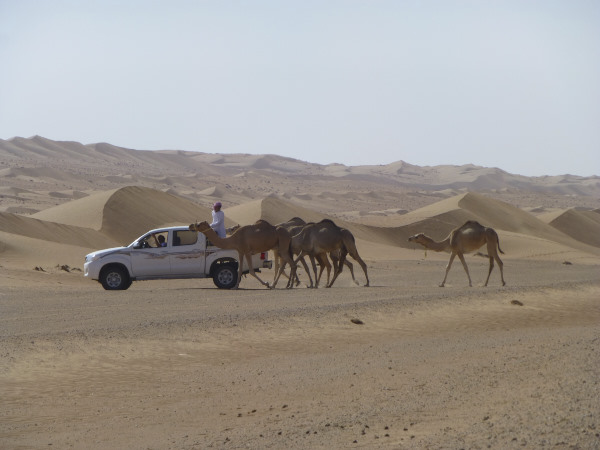
One evening in the heart of the Wahiba Sands we ate slow-braised lamb shanks under an open-sided Bedouin tent, the heat of the day wafting gently from sand that felt like a plush velvet blanket around my bare feet. Climbing a dune the next morning literally took my breath away, but was rewarded by a tangerine sun rising behind the undulating sea of sand stretching 100 kilometers to the coast. Putting my nose close to the sand — not to sniff, just to see…I’m pretty nearsighted– I was able to pick out myriad dainty tracks coursing over the surface, evidence of a nighttime insect jamboree. The steep slide down the dune face took a quarter of the time as going up and was four times the fun.
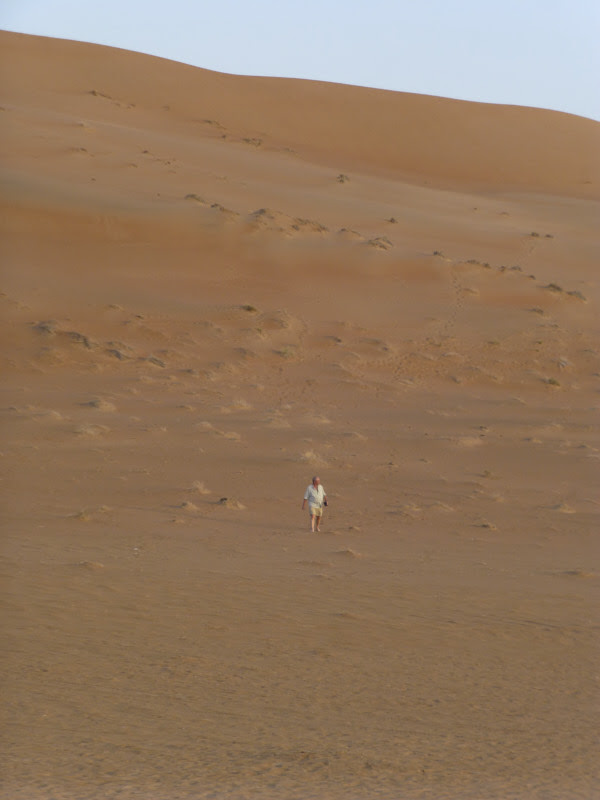
Another evening we watched shooting stars from red cushions set on a Persian carpet within feet of the Gulf of Oman, and the next morning emerged from our tent to waves softly lapping the cobbled sands as a small white fishing boat puttered up the coast to bring in the morning’s catch.
As far as village life, it’s as if India across the way (far across the way, let’s face it) has sucked all the chaos of life away from Omani villages. They’re empty here. I don’t mean that they’re abandoned or vacant. The courtyard walls which enclose houses in Omani villages houses (which is all we can see) look well-tended, leading me to believe they’re all inhabited. It’s rather that we don’t see anyone doing anything, whether working the wadi groves, buying something in a shop, or simply going from place to place on the street. In the not insubstantial number of kilometers we’ve already driven, only once have we seen someone minding a herd of goats.
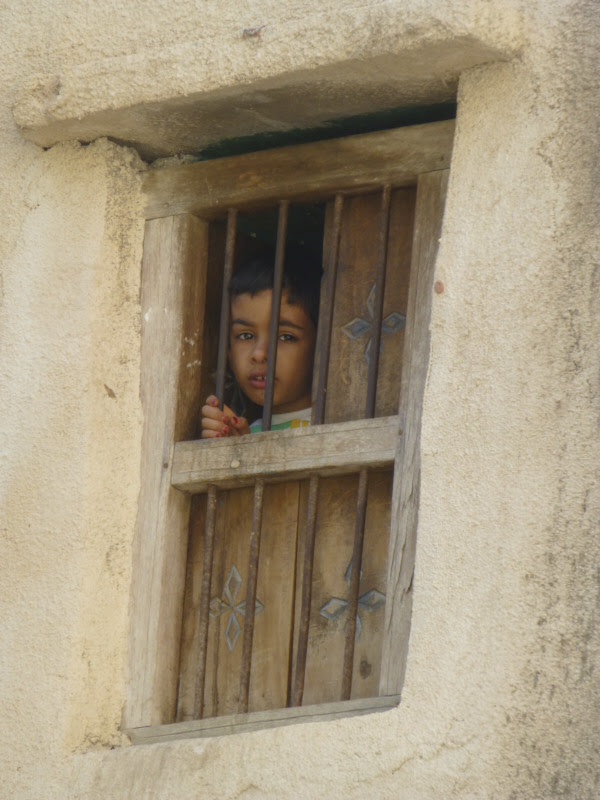
Village commerce is modest and repetitive, which I know for sure because all signs are translated into English. There’ll be a Coffee Shop, which is actually a small room offering Nescafe, a cooler of sodas, sometimes a trunk freezer with ice cream, occasionally a kebab or flat bread. There’ll also be a Ladies Tailoring and a Gents Tailoring, definitely separate. And perhaps a Fruits & Vegetables For Sale shop. In bigger villages that sign may say Fruits & Vegetables & Dates, and share a wall with a Barber. And in towns of substance there may be a Hypermarket, some small restaurants typically serving Turkish or Indian food, and assorted electronics, hardware and feed stores. The towns actually are the one place where we see activity, with some Toyota Land Cruiser pickups and 4x4s coming and going on errands.
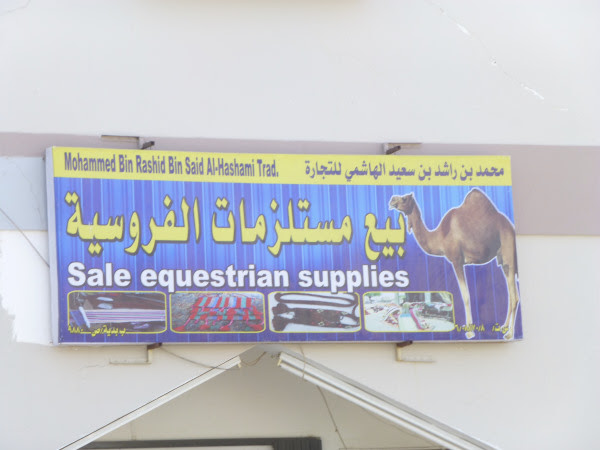
Here’s another thing about Oman: like the villages, the roads are pretty much empty. This is strange, given that Oman is an oil-rich country where fuel costs little more than $1.10/gallon. Empty roads and I get along very well. No white-knuckled clutching of the oh-shit handle when Bernard swerves around a bullock cart, narrowly missing 15 oncoming motorbikes. No worries about avoiding that somnolent sacred cow in the middle of the road while refraining from crashing off the ragged pavement edge. No yelps as a pedestrian steps into the causeway, oblivious to how fast we’re really going. What traffic there is moves along civilly. No honking. NO HONKING!!!! Not only is there an absence of co-traffic, the roads are perfect. No potholes to dodge, little dust to inhale. It’s been so quiet out here that we’ve actually been able to speak to each other.
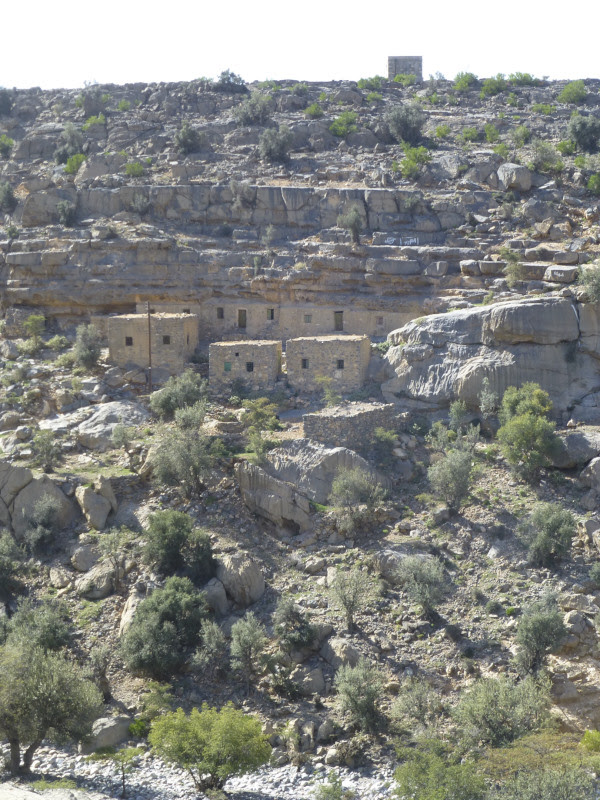
One last thing: yesterday an elderly woman in Sayq village invited us into her home. You have to imagine this village, which was like the ones I described above only smaller, quieter and sun drenched. The small central plaza past the mosque was deserted except for two women, one in a black robe, the other in yellow, walking toward us and chatting loudly. I expected them to detour around us, obvious foreigners that we were, but instead they came up, making gestures for us to follow them. Down the street, a left turn into a narrow alley and we find ourselves stooping under the low sill of a carved red wood door. Now we’re inside someone’s private courtyard, where we leave our sandals as the women wave us to follow them barefoot. We enter a long, narrow room covered in yellow Persian carpet, walls white-washed, the floor lined with large gold-tasseled cushions. Shuttered slit windows keep the room cool and dim.
At the far end I see an immense brass platter heaped with fruits, nuts and bowls of Omani sweets. There are chased brass basins of water to rinse our fingers. A carafe sits amidst a matched set of little china cups painted with burgundy and gold. While Bernard does the polite thing and waits by the door, I feel myself gravitate toward the platter. It’s Dina as metal shaving against food as magnet, and we all know who’s going to win in that contest. Fortunately this appears to please our hostesses immensely. They put their fingers to their lips and make loud chomping noises, pointing next at the platter, and then at me and Bernard.
What is going on here? The ladies didn’t even know we were coming, so they couldn’t have prepared this for us. Are they a clandestine restaurant? Is this the left overs from breakfast? I’ll report the details in a few days….
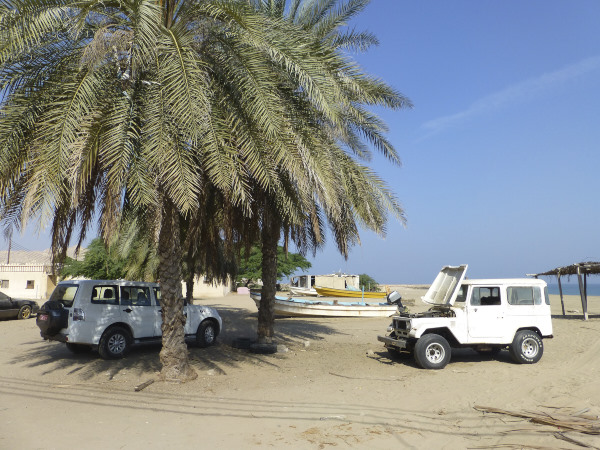
Posted in Dispatches, Oman
Leave a comment










